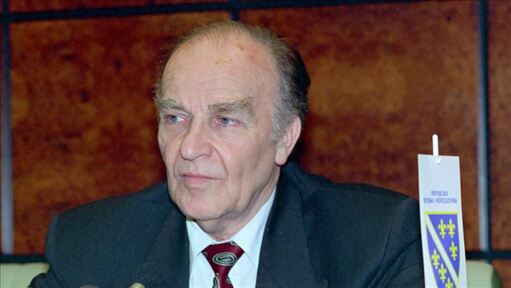On the return of nationalism – Yuli Tamir in Haaretz:
‘Patriotism is back: Readiness to sacrifice oneself for the homeland is fashionable now. It’s the brave and honest thing to do. We struggle for our community – honoring the past, for the sake of the future, say young people in the streets of Ukraine. Europe applauds them, embarrassing the power of nations to defend their rights.
“We admire the Ukrainians who are shielding their country,” says European Commission President Ursula von der Leyen. “The Russian invasion is a violation of international law, of democracy, of fundamental human rights.”
The West is reminded of its conceptual roots, the foundations of its national democracies. How simple, how clear is the message: the Ukrainian people deserve independence – self-rule, national self-determination.
If we fall, Europe will fall with us, democracies will collapse, says Ukrainian President Volodymyr Zelenskyy. His nationalism is sweeping, liberal, universal. It’s not about “me or you,” it’s “me and you”: We are marching together, waving the flags of national freedom, regional partnership, global responsibility. His universal nationalism and particular values coalesce like they did in the age of de-colonization and self-determination.
Pitted against them is a drab, disintegrating empire, headed by an Old-World leader who has not lost the craving to rule. It too is sending out national slogans, adopting separatist nationalism, supporting the demands for independence of the eastern Ukrainian districts of Donetsk and Luhansk.’
(…)
‘Political nationalism, liberal and liberating, is back. It encountered democracy again at the right moment, and the two have curled up in a mutual embrace, until the next crisis. When it happens – and it will happen – it’s important to remember the conceptual framework that enabled this embarrassing situation. Theodor Herzl phrased it in an apt and concise way: a demand to be a nation, like all nations, recognized by the law of nations. A nationalism that belongs simultaneously to its owners and to the whole of humanity.
The rapid transition from repulsion to nationalism to the present embrace is instructive about nationalism’s multiple faces and intoxicating force. Like Janus, the two-faced Roman god, modern nationalism can be a force of liberation and progress, as it was during the fall of the empires, and a force of oppression; a divisive power that spurs separatism and a uniting one that motivates national cohesion.’
(…)
‘Marx was wrong to assume that the workers of the world would unite and march shoulder to shoulder toward a common liberation; at most they will wage a common struggle for workers’ rights and minimal wages. Nationalism thus succeeds where race, gender and religion all failed. Although it offers an imagined identity, relatively new and unstable, it is the only force that can reconcile personal freedom with a demand for collective self-rule.’
(…)
‘The third is that the social and political force that balances nationalism is not individualism, as many theorists assumed, but the sanctification of the status quo. History is written by the winners, and nobody wants to examine the narrative on which it is built.
Who is a Ukrainian? Or a Donetskian? This is a slippery-slope question, as next some may be compelled to ask who is a Frenchman, an Englishman, a German or a Spaniard.
Josep Borrell, the EU minister of foreign affairs, a former foreign minister of Spain, and a vehement opponent to Catalonian separatism made an embarrassing slip of the tongue recently. We support Ukraine, he said, and its leader Zelenskyy, who stayed to fight for his country and did not leave hidden in a car (referring to Carles Puigdemont, the Catalonian leader who fled his land to avoid arrest.) We hear you, say Catalonians: Today, Ukraine occupies center stage, but our day will come, our nationalism is no less firm and valid than theirs. The Palestinians are also awaiting an opportunity, and who can tell them that nationalism is dead or that they are not a people?’
Read the article here.
Nationalism is not dead. God is not dead. And hypocrisy is not dead. Fair enough.
But what do we mean by nationalism?
Putin is the evil enemy, and indeed, he is the enemy, but what is the difference between his nationalism and the nationalism that Zelenskyy made so appealing?
There are distinctions, but the similarities are more interesting, a belief in the mystical existence of the own nation state.
Quickly it has been forgotten that slightly more than one hundred years ago Lviv was called Lemberg and proudly part of the Austro-Hungarian Empire. Quite a few died for this Austrian-Hungarian empire, and then is disappeared from the earth, quickly but not without pain. This is of course not to say that Putin has any right to invade Ukraine, just to remind us all that mythical beliefs and historical facts don’t go well together.
I’m willing to distinguish between good and bad nationalism, I prefer the distinction between harmful and more or less harmless nationalism, but I’m not sure if the nation state is indispensable.
After all, the sovereignty of most nation states is largely based on illusions.
And populists in the West complain that democracy is not the same as self-determination. They long for a strong man, often they have secret or less secret sympathies for Putin.
In other words, the brand of nationalism that Zelenskyy made sexy is less self-evident than Tamir seems to think.
Also, as noted before, yes we speak about sacrifices, but the sacrifice the West is willing to make, at best, is to spend five minutes less in the shower every day.
Dying is for the Asians. Or the Ukrainians.
Sexy nationalism is nationalism-light and it will fade away quickly, as quickly as the war in Iraq faded away from our collective memory.
A last note, if only the Muslims in Bosnia would have had a Zelenskyy, but they got Alija Izetbegović. Alas, history is not fair.
